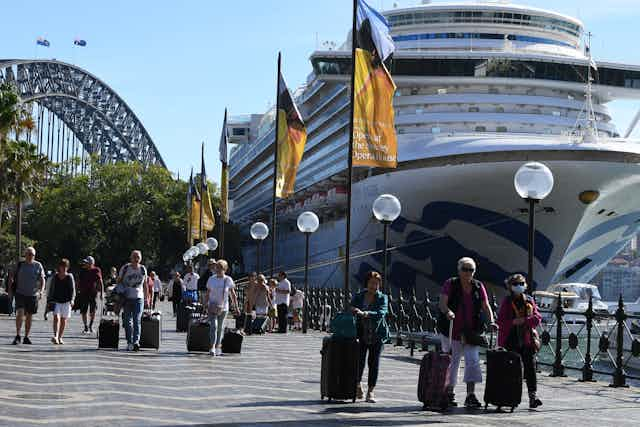The inquiry commissioned by the Berejiklian government into the Ruby Princess COVID-19 disaster has laid blame on NSW health officials, who made “inexcusable” and “inexplicable” mistakes. It also exonerated the Australian Border Force.
In the report, the federal government was sharply criticised for refusing to allow an official to appear before the inquiry, with commissioner Bret Walker SC saying this belied Prime Minister Scott Morrison’s promise of full cooperation.
Some 2,700 passengers from the Carnival Australia cruise ship were allowed to disembark on March 19 before the test results for COVID-19 had come back. The passengers, some of whom had displayed respiratory symptoms, scattered widely, spreading the virus. This led to hundreds of cases, with some 28 deaths linked to the cluster.
Walker found serious mistakes and misjudgements on the part of health officials. He said that in light of all the information the NSW health expert panel had, “the decision to assess the risk of the Ruby Princess as ‘low risk’ – meaning, in effect, ‘do nothing’ – is as inexplicable as it is unjustifiable. It was a serious mistake”.
It should have been assumed there were possible infected passengers “who could transmit the virus and perhaps spark an outbreak of infection, if no steps were taken to prevent or limit that outcome”.
Passengers should not have been allowed to spread through the community until test results were known.
“The delay in obtaining test results for the swabs taken from the Ruby Princess on the morning of 19 March is inexcusable. Those swabs should have been tested immediately,” Walker said.
“The failure to await test results on 19 March is a large factor in this commission’s findings as to the mistakes and misjudgements that caused the scattering of infected passengers.”
Walker criticised the cruise line for not having enough swabs aboard but said, given this, there should have been dockside swabbing.
There has been speculation about whether the Australian Border Force had any responsibility for the disaster, but Walker stressed “neither the ABF nor any ABF officers played any part in the mishap”.
“The relevant legislative provisions make it crystal clear that the Australian Border Force (ABF), despite its portentous title, has no relevant responsibility for the processes by which, by reference to health risks to the Australian community, passengers were permitted to disembark,” he said.
But Walker was blunt about the federal government’s attitude to the inquiry. “The one fly in the ointment so far as assistance to this commission goes, is the stance of the Commonwealth.
"A summons to a Commonwealth officer to attend and give evidence about the grant of pratique for the Ruby Princess was met with steps towards proceedings in the High Court of Australia.
"Quite how this met the prime minister’s early assurance of full cooperation with the commission escapes me.
"This waste of time and resources, when time, in particular, was always pressing, was most regrettable.”
Walker said it seemed a “practical approach was swamped by a determination never to concede, apparently on constitutional grounds, the power of a state parliament to compel evidence to be provided to a state executive inquiry (such as a royal commission or a special commission of inquiry) by the Commonwealth or any of its officers, agencies or authorities.”
Labor’s shadow minister for home affairs, Kristina Keneally, said that on March 15, Morrison had said he was putting in place “bespoke arrangements” for arriving cruise ships.
“He promised cruise ships would be ‘directly under the command of the Australian Border Force’.
"What ‘bespoke arrangements’ did Scott Morrison put in place for arriving cruise ships? This report shows there were none,” Keneally said.

